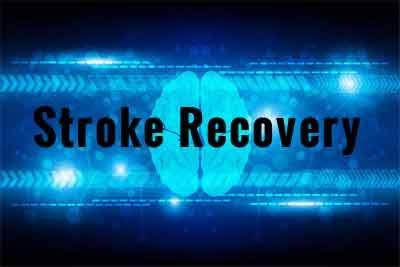- Home
- Editorial
- News
- Practice Guidelines
- Anesthesiology Guidelines
- Cancer Guidelines
- Cardiac Sciences Guidelines
- Critical Care Guidelines
- Dentistry Guidelines
- Dermatology Guidelines
- Diabetes and Endo Guidelines
- Diagnostics Guidelines
- ENT Guidelines
- Featured Practice Guidelines
- Gastroenterology Guidelines
- Geriatrics Guidelines
- Medicine Guidelines
- Nephrology Guidelines
- Neurosciences Guidelines
- Obs and Gynae Guidelines
- Ophthalmology Guidelines
- Orthopaedics Guidelines
- Paediatrics Guidelines
- Psychiatry Guidelines
- Pulmonology Guidelines
- Radiology Guidelines
- Surgery Guidelines
- Urology Guidelines
New method improves aphasia treatment after stroke

A new treatment has been shown to significantly improve the speech and word production, Aphasia of stroke patients.
The treatment- developed by a speech therapist and cognitive neuroscientists at The University of Manchester- uses special software which gradually makes patients produce words increasingly quickly.
The researchers have published their findings in the journal Brain and they hope that the treatment will eventually improve the ability of stroke patients with aphasia across the NHS to access intensive treatment, and improve their symptoms and speech recovery after stroke.
The new treatment- tested on 20 stroke patients – was shown by the researchers to be around twice as effective in terms of words deployed by the patients in their speech.
The treatment, which is administered over several training sessions, uses photos shown on a laptop, initially giving patients 3 seconds to react. Gradually, the time is reduced, aiming to achieve a response of 1 second – which is normal for people over 65.
The research was funded by the Medical Research Council, the Rosetrees Trust and the European Research Council.
The researchers are based at the University of Manchester’s Neuroscience and Aphasia Research Unit.
Dr Paul Conroy, Clinical Lecturer in Speech and Language Therapy, said “We know from Stroke Association data that there are more than 100,000 strokes in the UK each year, that is around one stroke every five minutes.
“So there are over 1.2 million stroke survivors in the UK and about one third of stroke survivors will have aphasia as a long term disability.”
Dr Conroy explained: “And though symptoms can vary, the consequences of aphasia at its worst can be devastating; not being able to use words, understand, read or write words can be very tough even at the less affected end of the spectrum.
“So we’re excited this new approach seems to yield significant benefits.”
The researchers tested three measures, each compared to standard speech therapy treatment – and then retested the patients after a month.
The accuracy of the patients’ word retrieval was 25% better with the treatment and 10% better with the standard treatment.
Deployment - the use of words appropriately in speech – rose from 17% to 59% after treatment, compared to 14% to 33% with standard treatment. Patients with no treatment at all improved from 15% to 24% - so the impact of standard treatment was limited.
And in terms of speed of response, patients improved from 3 seconds to 1.6 seconds with the new treatment and 3 seconds to 2 seconds with standard treatment. However, the effect of the standard treatment was lost after a month whereas the effect of the new treatment remained.
Professor Matthew Lambon Ralph who is a cognitive neuroscientist said: “This is a novel approach: we had not really considered before that speed of naming seems to play an important part in speech therapy.”
“It’s cheap, quick to administer and more effective than current treatments.
“However, now that we have proof of principle, we hope to move on to a larger scale multi-centre trial.
“But our ultimate aim is for this treatment to be available for the NHS within 5 years.”
The paper ‘Time for a quick word? The striking benefits of training speed and accuracy of word retrieval in post-stroke aphasia’ is published in Brain.

Disclaimer: This site is primarily intended for healthcare professionals. Any content/information on this website does not replace the advice of medical and/or health professionals and should not be construed as medical/diagnostic advice/endorsement or prescription. Use of this site is subject to our terms of use, privacy policy, advertisement policy. © 2020 Minerva Medical Treatment Pvt Ltd